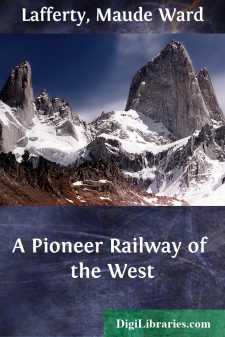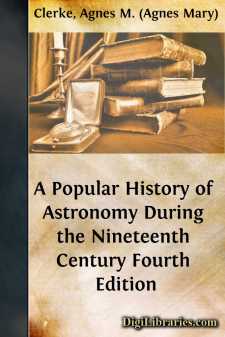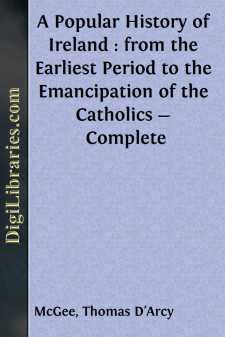History
- Africa 30
- Americas (North Central South West Indies) 50
- Ancient 68
- Asia 58
- Australia & New Zealand 8
- Canada 41
- Caribbean & West Indies 1
- Civilization 20
- Eastern Europe 12
- Europe 310
- Expeditions & Discoveries 60
- General 77
- Historical Geography 1
- Jewish 9
- Latin America 3
- Medieval 8
- Middle East 13
- Military 248
- Revolutionary 8
- Study & Teaching 5
- United States 353
- Western Europe 56
- World 13
History Books
Sort by:
This restoration of a portion of the original track of theLexington and Ohio (now Louisville and Nashville) Railroadlaid at Lexington in 1831, is dedicated to those men offorethought and courage who were pioneers in railroaddevelopment in America. Erected Anno Domini MCMXVI. Dedication Exercises 10 A. M. May 30, 1916 College of Mechanical and Electrical Engineering University of Kentucky During the...
more...
INTRODUCTION We can distinguish three kinds of astronomy, each with a different origin and history, but all mutually dependent, and composing, in their fundamental unity, one science. First in order of time came the art of observing the returns, and measuring the places, of the heavenly bodies. This was the sole astronomy of the Chinese and Chaldeans; but to it the vigorous Greek mind added a highly...
more...
by:
Robert Black
CHAPTER XVII. THE CRUSADES, THEIR DECLINE AND END. In the month of August, 1099, the Crusade, to judge by appearances, had attained its object. Jerusalem was in the hands of the Christians, and they had set up in it a king, the most pious and most disinterested of the crusaders. Close to this ancient kingdom were growing up likewise, in the two chief cities of Syria and Mesopotamia, Antioch and Edessa,...
more...
by:
Robert Black
CHAPTER I. GAUL. The Frenchman of to-day inhabits a country, long ago civilized and Christianized, where, despite of much imperfection and much social misery, thirty-eight millions of men live in security and peace, under laws equal for all and efficiently upheld. There is every reason to nourish great hopes of such a country, and to wish for it more and more of freedom, glory, and prosperity; but one...
more...
by:
Robert Black
CHAPTER XXIII.——THE HUNDRED YEARS' WAR—CHARLES VI. AND THE DUKES OF BURGUNDY. Sully, in his Memoirs, characterizes the reign of Charles VI. as "that reign so pregnant of sinister events, the grave of good laws and good morals in France." There is no exaggeration in these words; the sixteenth century with its St. Bartholomew and The League, the eighteenth with its reign of terror, and...
more...
by:
Robert Black
CHAPTER XXXV. HENRY IV., PROTESTANT KING. (1589-1593.) On the 2d of August, 1589, in the morning, upon his arrival in his quarters at Meudon, Henry of Navarre was saluted by the Protestants King of France. They were about five thousand in an army of forty thousand men. When, at ten o'clock, he entered the camp of the Catholics at St. Cloud, three of their principal leaders, Marshal d'Aumont,...
more...
by:
Robert Black
CHAPTER XXVIII. FRANCIS I. AND CHARLES V. The closer the study and the wider the contemplation a Frenchman bestows upon his country's history, the deeper will be his feelings of patriotic pride, dashed with a tinge of sadness. France, in respect of her national unity, is the most ancient amongst the states of Christian Europe. During her long existence she has passed through very different...
more...
by:
Robert Black
CHAPTER XLIX. LOUIS XIV. AND HIS COURT. Louis XIV. reigned everywhere, over his people, over his age, often over Europe; but nowhere did he reign so completely as over his court. Never were the wishes, the defects, and the vices of a man so completely a law to other men as at the court of Louis XIV. during the whole period of his long life. When near to him, in the palace of Versailles, men lived, and...
more...
Ireland, lifting herself from the dust, drying her tears, and proudly demanding her legitimate place among the nations of the earth, is a spectacle to cause immense progress in political philosophy. Behold a nation whose fame had spread over all the earth ere the flag of England had come into existence. For 500 years her life has been apparently extinguished. The fiercest whirlwind of oppression that...
more...
Sir Henry Sidney, in writing to his court, had always reported John O'Neil as "the only strong man in Ireland." Before his rout at Lough Swilly, he could commonly call into the field 4,000 foot and 1,000 horse; and his two years' revolt cost Elizabeth, in money, about 150,000 pounds sterling "over and above the cess laid on the country"—besides "3,500 of her...
more...











